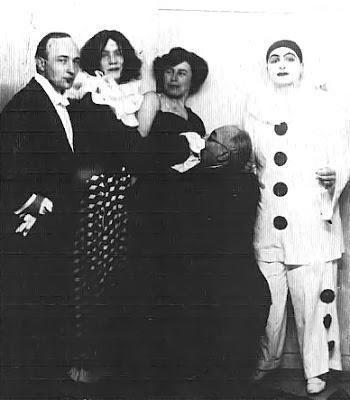You can see and hear Kraus reading from one of his texts at 8.21 in the above clip.
Among Karl Kraus' fans were many first-rate geniuses. Kafka, Wittgenstein, Canetti (who wrote about Kraus on pp. 65-74 on The Torch in My Ear), Benjamin (who also wrote about Kraus), Berg, and Webern all avidly followed Kraus' journal, Die Fackel. So, I'm intrigued when other geniuses are strongly critical of Kraus. In some cases, the antipathy is to be expected, as when Freud has this to say about one of his most acerbic critics:
I was very proud of the message you dedicated to me, but then again annoyed that you made an obeisance to Karl Kraus who stands at the very bottom of my ladder of esteem. (letter to Arnold Zweig, Dec. 2, 1927, The letters of Sigmund Freud and Arnold Zweig, ed. Ernst L. Freud)More puzzling are Robert Musil's repeated digs at Kraus. I first learned of these barbs from a letter by Walter Kaufmann in the August 9, 1973 issue of the New York Review of Books. The letter was part of an exchange with Erich Heller. Kaufmann quoted this passage from Musil's diary:
Long before the dictators, our times brought forth spiritual veneration of dictators. Stefan George, for instance. Then Kraus and Freud, Adler and Jung as well. Add to these, Klages and Heidegger. What is probably common to these is a need for domination and leadership, for the essence of the savior. (Diaries: 1899-1941, selected & trans. Philip Payne, (Basic Books, 1998, p. 432)As far as I can tell, this diary entry is from late August, 1937. Its assimilation of Kraus to Freud seems especially biting in view of Kraus' low opinion of psychoanalysis. In effect, Musil is saying that Kraus was no better than the figures whom he had especially despised.

Musil, Ea von Allesch, Martha Musil, & Franz Blei with unidentified clown
Photo Source.Musil took Kraus to resemble Freud in having something like the role of a 'savior'. This point about Kraus appeared much earlier in Musil's diary. In an entry under the heading 'Krausians' (c. 1924), Musil wrote,
Bettauer treats Kraus, who once pilloried him "unjustly," with pained reverence. ... Kraus is the redeemer figure; Kraus, by simply being there and pouring out abuse, makes everything good again. (Diaries, pp. 303-4)Consider this next entry from spring, 1939. Musil has just mentioned the view of National Socialism as a 'religious movement and a type of sect.' This leads him to consider psychoanalysis, another doctrine that putatively aspires to a comprehensive vision or world-view that makes sense of life. Of psychoanalysis' explanatory repertoire, Musil says,
These dozen concepts that its registered members use to explain the world. Any other scheme at all could probably achieve the same effect. ... That which has been explained is then left completely barren and there is not a single path, however narrow, that leads on further from there. (Total explanation as a bad sign.) In a minor key, the Kraus sect, the Klages sect, Jung, Adler. The "materialistic interpretation of history" also had the same function. (Diaries, p. 481)'Total explanation as a bad sign' -- we are close to Popper's critique of psychoanalysis, Marxism, etc., according to which any such theory that seems capable of explaining everything, come what may, in fact explains nothing; since the theory can accommodate every possible outcome, it rules out no possible outcome and therefore lacks determinate, empirical content. The theory makes no interesting predictions, or 'there is not a single path ... that leads on ... from there.'
It seems unfair to include Kraus in the same category as Klages and the psychoanalysts (let alone the National Socialists), for while Kraus may have resembled leaders of quasi-religious sects in one respect, he lacked one of their defining features. Specifically, there may have been a cult of celebrity around Kraus -- he may even have been regarded by some as radiating a savior's charisma -- but he didn't preach a new and supposedly comprehensive view of life as an answer to all your questions and a cure to whatever ails you.
So, why the invective in Musil's remarks about Kraus? I don't know. It might have resulted from Kraus' feud with Alfred Kerr, who had been Musil's mentor (and who was Judith Kerr's father).
